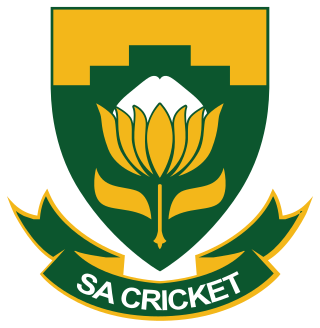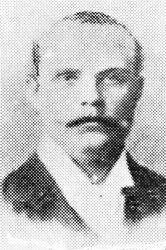Related Research Articles

The South Africa men's national cricket team, also known as the Proteas, represent South Africa in men's international cricket and is administered by Cricket South Africa (CSA). South Africa is a full member of the International Cricket Council (ICC), Its nickname derives from South Africa's national flower, Protea cynaroides, commonly known as the "King Protea".
Kepler Christoffel Wessels is a South African-Australian cricket commentator and former cricketer who captained South Africa after playing 24 Tests for Australia. Since retiring he has been a lawn bowls competitor.
Peter Noel Kirsten is a former cricketer who represented South Africa in 12 Test matches and 40 One Day Internationals from 1991 to 1994. He is the current coach of the Ugandan national side, having been appointed in August 2014.

Durant Clifford "Dante" Parkin was a South African cricketer who played in one Test match in 1892.

George Keyworth Glover was a South African cricketer who played in one Test in 1896.

Alfred Renfrew Richards was a South African sportsman who represented his country at Test cricket and rugby union. Born in Grahamstown, Cape Colony, and educated at The Leys School in Cambridge, Richards was capped three times for South Africa in rugby, including captaining them once, and made one Test cricket appearance, also as captain.

Albert Edward Ernest Vogler was a South African cricketer. A leading all-rounder skilled both at batting and bowling, Vogler played cricket in South Africa prior to becoming eligible to play for Middlesex County Cricket Club in England after serving on the ground staff of the Marylebone Cricket Club at Lord's. He rose to prominence during the 1906 home Test series and then in England the following year: he was described during the latter as the best bowler in the world by Tip Foster, and named a Wisden Cricketer of the Year.

John McIllwaine Moore "Mick" Commaille was a South African cricketer who played in 12 Tests from 1909–10 to 1927–28. He also played international amateur football for South Africa.
George Finlay Bissett was a South African cricketer who played in four Test matches in the 1927–28 season. He was born at Kimberley, Cape Province and died at Botha's Hill, Natal.
Archibald William Palm was a South African cricketer who played in one Test match in 1927–28. He was born in Rondebosch, Cape Town and died at Somerset West, Cape Province.
John Bruce Plimsoll was a South African cricketer who played in one Test match in 1947, against England in Manchester.

Herbert Hayton Castens was a South African rugby union footballer and cricketer. He captained South Africa at both rugby and cricket, and played an important role in the development of rugby and cricket in South Africa, both on and off the field. He was usually known as H. H. Castens.
Howard Hugh Watt was the last surviving pre-war Springbok and part of the South African rugby team nicknamed "The Invincibles". Nicknamed Sparkle, he was both a cricketer and rugby player.
This article describes the history of South African cricket from its known beginnings until the end of the First World War in 1918.
The England cricket team toured South Africa from 8 November 1938 to 14 March 1939, playing five Test matches against the South Africa national team and 13 tour matches against various provincial sides. England won the third Test by an innings and 13 runs, but the other four Tests finished as draws, including the final timeless Test, which was played over the course of 10 days. The final Test was declared a draw, as the England team had to leave to ensure they caught the boat home from Cape Town.
South Africa resumed official international cricket in 1991 after the moratorium imposed by the International Cricket Conference in 1970 was lifted. This was the first edition of the sir Vivian Richards trophy. This had restricted official contact with South Africa as a response to the policy of apartheid and South Africa's refusal to select non-white players for their international sporting teams. It formed part of the wider sporting boycott of South Africa during the apartheid era. The South African national team made a short tour of India in 1991. It then played in the 1992 Cricket World Cup in Australia and New Zealand. The decade saw a number of tours of South Africa by major international teams as well as the continued playing of domestic competitions.
This article describes the history of South African cricket from the 2000–01 season. Noted South African players in the 21st century have included Jacques Kallis, Shaun Pollock, Makhaya Ntini, Mark Boucher, Graeme Smith and Herschelle Gibbs.
T. E. C. "Tommy" Hobson was a South African international rugby union player.
Alfred Edward Cooper was a South African cricketer who played at first-class level for Griqualand West and Transvaal).
References
- ↑ "Albert Powell". CricketArchive. Retrieved 15 September 2023.
- ↑ "2nd Test, Cape Town, April 01 - 04, 1899, England tour of South Africa". Cricinfo. Retrieved 15 September 2023.
- ↑ Bertie Powell rugby profile Scrum.com
- ↑ "John Powell". CricketArchive. Retrieved 15 September 2023.